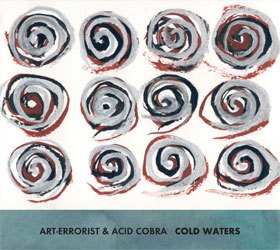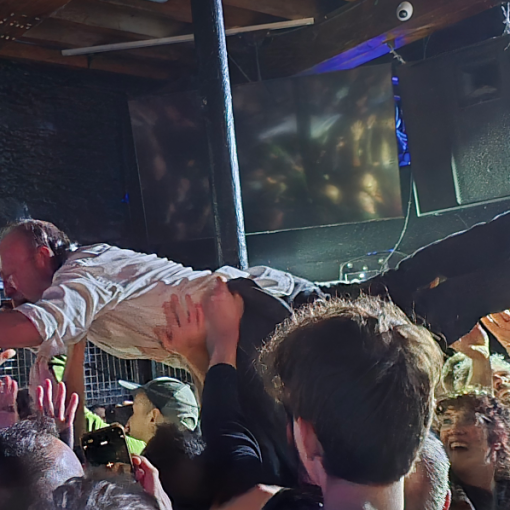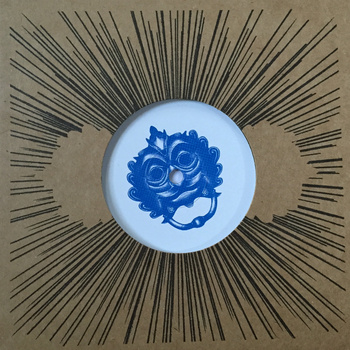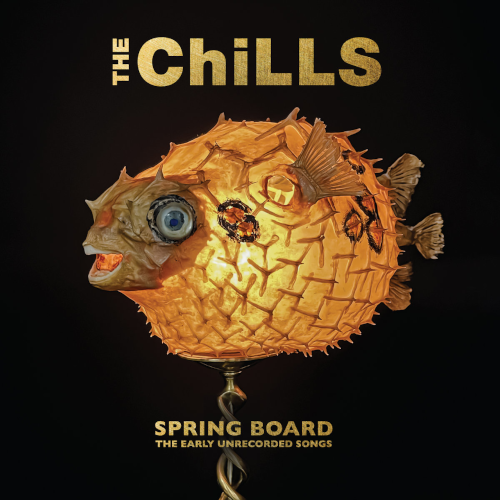Label: Studio Philo/Music Video Distributors Format: DVD
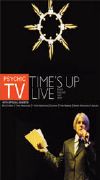 When Genesis P-Orridge returned to London in 1999 after nearly a decade of tabloid media-inspired witchhunt and subsequent exile to America, there was no doubt that the reappearance of Psychic TV on stage would be an event. That GPO’s manifestation resulted in broadsheet The Guardian running an extensive feature on his welcoming into the very heart of the arts establishment was almost as remarkable as the fact that PTV would be playing in the Royal Festival Hall itself, site of many a surprise underground-made-overground event before and since, but never one quite so outré.
When Genesis P-Orridge returned to London in 1999 after nearly a decade of tabloid media-inspired witchhunt and subsequent exile to America, there was no doubt that the reappearance of Psychic TV on stage would be an event. That GPO’s manifestation resulted in broadsheet The Guardian running an extensive feature on his welcoming into the very heart of the arts establishment was almost as remarkable as the fact that PTV would be playing in the Royal Festival Hall itself, site of many a surprise underground-made-overground event before and since, but never one quite so outré.
Thanks for this eagerly-anticipated marathon gig is largely due to the then-head of contemporary arts programming, David Sefton, and as the accompanying Cut Up Concert documentary on the DVD recognizes, Time’s Up was quite a pageant of psychedelic luminosity. P-Orridge was as keen to have an array of freaks and inspirational fellow travellers as his guests and accompanists, and his selection of Billy Childish And Thee Headcoats, ? & The Mysterians and Scanner were at least promising, but best of all was the absolute necessity of bringing Bachir Attir and The Master Musicians Of Jajouka back to the South Bank Centre. Likewise, his own spoken word project Thee Majesty offered the possibility of as much fun and games as only the prospect of an camp arch-fiend menacing the stage in front of a royal box occasionally frequented by an actual Queen could – with the exception of the very icing on the ironic cake which inspired the selection of fellow exile Quentin Crisp as VJ for the night’s frivolities.
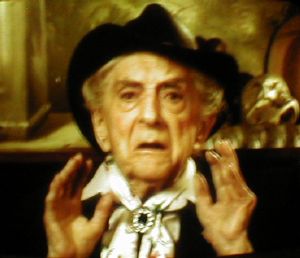 Taking place not only on Beltane but the day of a mass pro-cannabis festival in South London, the auspices for the gig could hardly have been better for creating a mood of gathered tribes descending with pagan glee upon the heart of Babylon’s pleasure dome by the Thames. The thronged weirdos, industrialists, heads and ageing Psychick Youth all seemed eager to witness just what Gen had in mind for bringing the psychedelick and dangerous PTV sound and lightshow to a grand stage…
Taking place not only on Beltane but the day of a mass pro-cannabis festival in South London, the auspices for the gig could hardly have been better for creating a mood of gathered tribes descending with pagan glee upon the heart of Babylon’s pleasure dome by the Thames. The thronged weirdos, industrialists, heads and ageing Psychick Youth all seemed eager to witness just what Gen had in mind for bringing the psychedelick and dangerous PTV sound and lightshow to a grand stage…
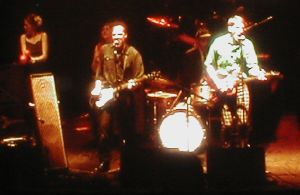 As the DVD records, the actuality of the gig was somewhat of a let down, if measured in objective musical terms. Space considerations on the disc mean that the support acts have their contributions trimmed down to one song each. Billy Childish and his Garage band perform the Alternative TV festival favourite “Action Time Vision” in clattery style in tribute to the return to the Gen camp of Alex Ferguson for the PTV show; however, ? And The Mysterians actually come across better performing their Sixties hit “96 Tears” on video than they did live; and as for Scanner, his gloopy electronica is something of an acquired taste, so it’s only fair to report that the single track left from his meandering set is all the better for not going on too long.
As the DVD records, the actuality of the gig was somewhat of a let down, if measured in objective musical terms. Space considerations on the disc mean that the support acts have their contributions trimmed down to one song each. Billy Childish and his Garage band perform the Alternative TV festival favourite “Action Time Vision” in clattery style in tribute to the return to the Gen camp of Alex Ferguson for the PTV show; however, ? And The Mysterians actually come across better performing their Sixties hit “96 Tears” on video than they did live; and as for Scanner, his gloopy electronica is something of an acquired taste, so it’s only fair to report that the single track left from his meandering set is all the better for not going on too long.
Thee Majesty is pretty much a stream of consciousness stand up show for P-Orridge; accompanied by Larry Thrasher and Bryinn Dall on dhol and feedback guitar respectively, a besuited and bobbed Gen makes an initial speech to the crowd. “People of control. Fuck you” is the simple message, followed by “We are nice. That’s what they don’t understand”. And at the heart of it all, perhaps that’s how the show and its recording is best described. Only two pieces from the live performance made it to the DVD, the echoed solo voice of “Eshu (At Last)” and “Flowering Pain Gave Space”. Raw, cracked and tuneless as his voice may be (and always has been), when GPO performs, time stops and people listen to the emotional textures as much as the words. To the projected background of a exotically lysergic lounge, he wanders to the scraped guitar and loping percussion, conversing in soliliquy from the other side of the looking glass.
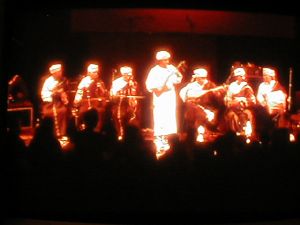 As for The Master Musicians, it’s both at this point that the concert and DVD spring to ecstatic life – with the crowd flocking down to the front of a usually-restricted stage front to cavort and sway in appropriately stoned manner to one of the most entrancing live acts on the planet. The four tracks or so representing their set on the disc convey a good proportion of the uplifting skirl of the ney, the twang and scrape of strings, the massed choruses of chanting, the furious rise and fall of the drums. It’s unfortunate that, thanks to the very nature of performers who can’t sit still but who are inspired to dance and prance, cut infectious capers and move as the mood of the hypnotic music takes them, the recording loses much of the thrilling bass beat of the drums as the musicians move away from their microphones. Still, the video captures the excitement of the moment, with occasional in-crowd shots adding to the feeling of being there again, and this section is a definite highlight.
As for The Master Musicians, it’s both at this point that the concert and DVD spring to ecstatic life – with the crowd flocking down to the front of a usually-restricted stage front to cavort and sway in appropriately stoned manner to one of the most entrancing live acts on the planet. The four tracks or so representing their set on the disc convey a good proportion of the uplifting skirl of the ney, the twang and scrape of strings, the massed choruses of chanting, the furious rise and fall of the drums. It’s unfortunate that, thanks to the very nature of performers who can’t sit still but who are inspired to dance and prance, cut infectious capers and move as the mood of the hypnotic music takes them, the recording loses much of the thrilling bass beat of the drums as the musicians move away from their microphones. Still, the video captures the excitement of the moment, with occasional in-crowd shots adding to the feeling of being there again, and this section is a definite highlight.
Despite a frenetic lightshow to accompany their psychedelic rock set, Psychic TVs performance is slightly disappointing. Filmed from every angle possible, including by onstage refugees from the Arabian Nights cavorting with their camcorders behind sheer gauze veils, there is an energy present which transcends the sometimes shoddy sound mix and Gen’s less than stellar (in conventional terms, that is) vocal technique. Op-art Psychic Crosses cascade, melt into spiralled chequerboards and trip-set image cut ups on the screens while the retina-bending coloured lights distort the band, flickering over P-Orridges patchwork coat of many colours. However, even the audience interaction and sheer charismatic presence of GPO can do little to diminish the fact the songs like “She Touches Me” and “I Like You” are delivered with all the woozy noodling and addled shudders of an Acid Test gone on too long.
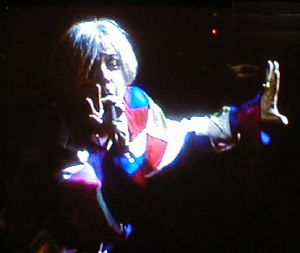 More bizarre is “Seduce Me”, in which a gentle love song is crooned in all apparent sincerity, including kisses exchanged with the audience. The sight of a demonised media devil coming on like Barry Manilow after too much MDMA is as peculiar as when Boyd Rice does the same sort of post-saccharine routine. As matters proceed uptempo to the synthetic kickdrum polyrhythms of “Jigsaw”, the Hyperdelic House mood which a good percentage of the audience seem to have been awaiting pulses to the tumbling hand-held cameras, slogans and electron microscopy on the highly effective back projections. Even the dancey beat is muted by murky sound mixing in the Festival Hall though, with the drum machine pounding and massively echoed vocals dominating everything. So much the better when the mood darkens and Pan is invoked on a droning Jajouka loop and an incremental kettle drum groove into a ritualistic freak out for “Feet Of Broken Glass”. This song reminds just how thoroughly Psychic TV can blow minds when they want to, as glossolalia vocals morph into gutteral wordless ullulations to the hypnotic rhythm.
More bizarre is “Seduce Me”, in which a gentle love song is crooned in all apparent sincerity, including kisses exchanged with the audience. The sight of a demonised media devil coming on like Barry Manilow after too much MDMA is as peculiar as when Boyd Rice does the same sort of post-saccharine routine. As matters proceed uptempo to the synthetic kickdrum polyrhythms of “Jigsaw”, the Hyperdelic House mood which a good percentage of the audience seem to have been awaiting pulses to the tumbling hand-held cameras, slogans and electron microscopy on the highly effective back projections. Even the dancey beat is muted by murky sound mixing in the Festival Hall though, with the drum machine pounding and massively echoed vocals dominating everything. So much the better when the mood darkens and Pan is invoked on a droning Jajouka loop and an incremental kettle drum groove into a ritualistic freak out for “Feet Of Broken Glass”. This song reminds just how thoroughly Psychic TV can blow minds when they want to, as glossolalia vocals morph into gutteral wordless ullulations to the hypnotic rhythm.
Of course, for a revival show, there wasn’t really any way a band containing Alex Ferguson wouldn’t play “Godstar”, and they seize the Pop moment with enthusiasm. Gen’s progress through the bouncing crowd is captured on video, and the epic triumph of the song is followed up with an excoriating prowl through the Rolling Stones‘ “Play With Fire” for the encore. Despite the occasional vocal strain and dodgy sound, the conclusion is satisfying enough to both what was a memorable event and to the record of it too.
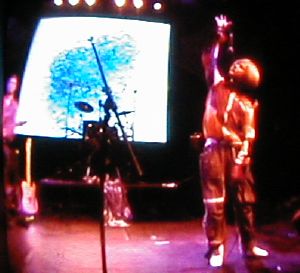 Despite the occasional shortcomings of the sound, sometimes sketchy performances and even the moments of blurry camerawork (which also add to the feeling of being there, somehow…), the sense of occasion which arose from this singular event is transmitted well by the concert footage and the informative behind the scenes documentary which accompanies it. Other welcome bonus features are the old-style classic videos of “Scared To live” and “Godstar (Hyperdelic)”. These are all Eighties 16-bit computer graphics, crazed genlock wipes and cuts over tape almost visible buckling with the intense strain of relatively unsophisticated technology bent out of shape in the service of extreme chemical dementia – and all the better for it. What other options did anyone have in the teeth of a rampant Thatcherite world of MTV and bland keyboard Pop but to delve to the extremes of what was suddenly becoming available to everyone with a VCR and an Amiga?
Despite the occasional shortcomings of the sound, sometimes sketchy performances and even the moments of blurry camerawork (which also add to the feeling of being there, somehow…), the sense of occasion which arose from this singular event is transmitted well by the concert footage and the informative behind the scenes documentary which accompanies it. Other welcome bonus features are the old-style classic videos of “Scared To live” and “Godstar (Hyperdelic)”. These are all Eighties 16-bit computer graphics, crazed genlock wipes and cuts over tape almost visible buckling with the intense strain of relatively unsophisticated technology bent out of shape in the service of extreme chemical dementia – and all the better for it. What other options did anyone have in the teeth of a rampant Thatcherite world of MTV and bland keyboard Pop but to delve to the extremes of what was suddenly becoming available to everyone with a VCR and an Amiga?
Finally, GP-O and Crisp have a convivially-staged casual (and twinklingly ironic) chat about the gradual acceptance of their outsider status by the British establishment, a conversation which provides a charmingly civilised coda to both a concert and DVD which celebrates the return of a man who was once a veritable wrecker of civilisation.
–Antron S. Meister–
